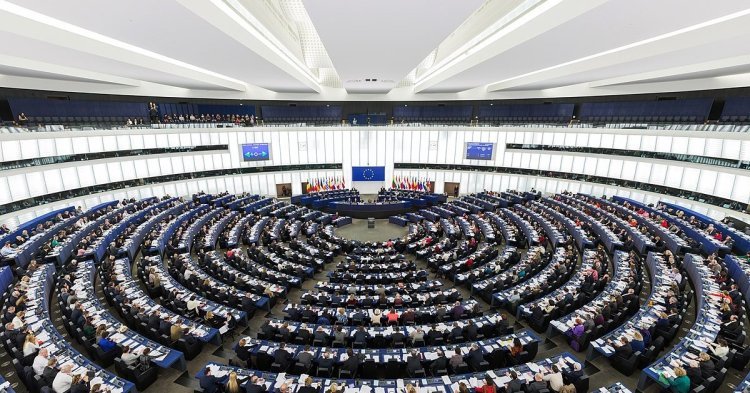The upcoming 2024 European elections are seen as an opportunity to move on European integration, social development, and the green transition, but are we really on the right track to achieve them?
Many of us have read famous dystopian novels such as “1984”, “Brave New World”, “Fahrenheit 451”, and others. Such books are alluring because they invite us to imagine worst-case outcomes for humanity. However, a common theme in these books is that they happen in a far future perspective, a perspective which takes place in societies which are sufficiently far from our own society as to not spread panic. Indeed, we rarely discuss real world near future dystopian scenarios.
That’s why when we saw a proposed workshop by the European Citizen Action Service (ECAS), JEF Frankfurt decided to implement in a short discussion with members at a Kneipe, a local Frankfurt bar. The essence of the discussion was to think together about the worst possible results of the elections, what would lead to those results, whether some of those things are currently happening and how we can change our course. The answers to these questions are complex and may vary wildly between regions and countries. Nevertheless, we did write down some points from our talk, which may be of interest to those discussing the European Elections.
1st question: “What would be the worst possible outcome from the European Parliament Elections 2024?”
A convergence of factors, from the rise of the far right to a fragmented political landscape, pose a significant threat to European democracy. The prospect of 20-25% of the parliament supporting far-right ideologies is a grave concern, compounded by the potential formation of a coalition of right to far-right between the ID, EPP, and ECR. Such an alliance, combined with a low voter turnout, may lead to political apathy similar to the turbulent history of the Weimar Republic. The fear is not merely of political polarization but of a fundamental shift in the discourse, with far-right ideologies infiltrating mainstream politics.
2nd question: “What would you do to achieve this worse possible outcome?”
To achieve this worst-case scenario, several things would need to happen. Encouraging support for far-right parties, discouraging voter participation, and deploying disinformation campaigns are identified strategies. Micro-targeting, particularly by far-right factions, aims to exploit divisions through perpetuating political paralysis and the existing disagreements among national governments in Europe.
3rd question: “Are we doing anything that resembles one of these things?”
Certain alarming trends are definitely happening right now. The lack of effective marketing for the EU, poor communication of successful policies, and mutual blaming among EU institutions weaken the overall image. Additionally, critical institutions are too weak, notably the European Parliament. The blame game between national politicians and EU institutions is actively damaging the credibility of the EU. The hyping of disagreements, both within and between institutions, creates a toxic environment, playing directly into the hands of far-right agendas. Lastly, the failure to address citizens’ concerns, as seen in unfulfilled promises regarding biodiversity, climate protection, and transnational voting lists, contributes to feelings of helplessness and apathy.
4th question: “What can we do to stop doing these things?”
The only way to stop those trends is to be proactive. Initiatives such as demonstrations, strikes, and improved communication and marketing for the EU are a must. There should also include clear statements against far-right ideologies and concerted efforts to encourage voter participation. Such campaigns cannot be more of the same but use a creative strategy – let’s go to bars, meeting places, parks, and generally the streets and discuss Europe. In the medium term, strengthening democratic processes within national parties and reducing the blame game within and between EU institutions are crucial steps toward restoring trust. In the long-term, empowering the European Parliament and to genuinely address citizens’ concerns and fulfill promises will instill a sense of empowerment among citizens. Pro-European and federalist forces especially should act collectively, transcending political and national boundaries, to safeguard the democratic principles- the basis of the European project. We must understand that the upcoming elections are not just a political exercise or a process; they are our responsibility and opportunity to shape the future of Europe.’
Are you also interested in participating in surveys and contribute to the political discussion? If so, check out the dedicated platform on ECAS website!


Follow the comments: |
|
